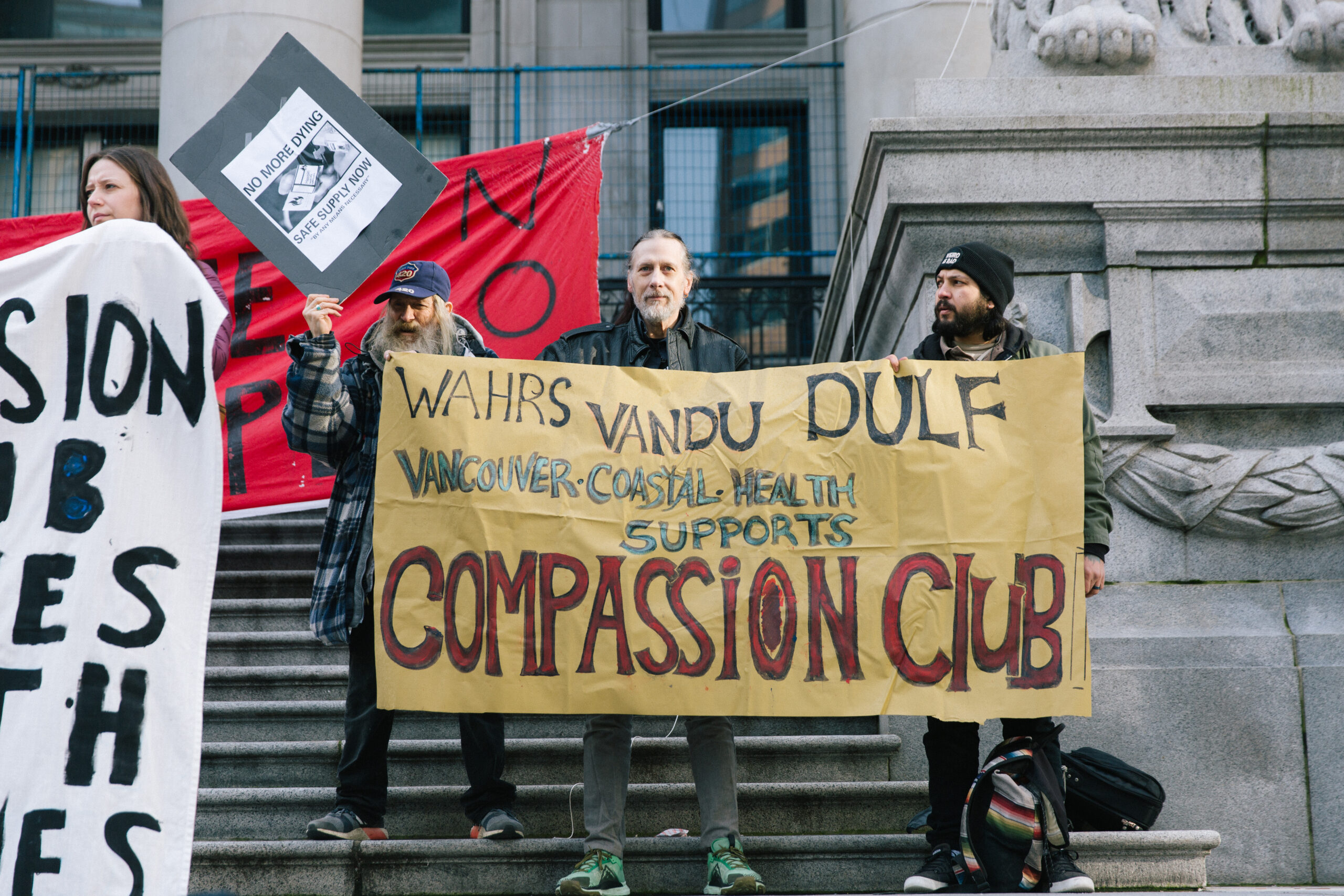The Drug User Liberation Front (DULF) has announced they will pursue a constitutional challenge in response to the Crown’s decision last week to press criminal charges against their founders, Jeremy Kalicum and Eris Nyx. Both have been charged with possession for the purpose of trafficking.
A Charter challenge is an expensive legal process and the group is asking their supporters to contribute financially, spread the word and host decentralized fundraisers to help meet their legal fund goal of $150,000.
Kalicum and Nyx were arrested in October 2023 by the Vancouver Police Department (VPD), two months after DULF released preliminary findings indicating that their novel compassion club program was yielding measurably successful outcomes.
Aaron Bailey, program coordinator with the Eastside Illicit Drinkers Group for Education (EIDGE), says, “News of these charges is alarming to our membership, the DTES community, and respected academics working in the substance use and harm reduction spheres. Eris Nyx and Jeremy Kalicum have risked their freedom to produce the evidence-base necessary to advance compassion clubs as one part of a broad continuum of health services to prevent drug toxicity death in BC.”
DULF’s compassion club has been one of the few supply-side interventions to the toxic drug supply crisis, which was declared a formal public health emergency in April 2016. After the compassion club was shut down, which occurred at the time of their arrests, peer-reviewed findings were published in the International Journal of Drug Policy, with results showing their intervention to be more effective than any other response to the drug toxicity crisis to date.
BC’s expert Death Review Panel on drug toxicity deaths also called for non-prescriber supply access to “urgently reduce the number of people dying” from the unpredictable, unregulated supply. David Eby’s governing BC NDP rejected the recommendation the same morning it was set to be released.
“Like the first buyers clubs of the HIV/AIDS pandemic, early syringe exchange proponents, or the founders of InSite, DULF acted outside of the law out of necessity…As a frontline worker and community-based researcher, it is deeply disturbing and infuriating to see charges laid in response to a demonstrably successful program that managed to address a gap in services that has been pointed to by the community and literature for several years,” added Bailey.
At the time of Kalicum and Nyx’s arrests by the VPD, a number of groups released immediate strong statements of support, including the Vancouver Area Network of Drug Users, Care Not Cops,and the BC Civil Liberties Association. The Canadian Drug Policy Coalition called the VPD’s actions “an act of political and moral cowardice.” A group of nurses also condemned the crackdown.
Members of DULF's compassion club said that the program and its founders “should be celebrated for saving our lives, for giving us a future. Not just for us, but for drug users everywhere.”
The drug toxicity crisis is a national issue and DULF’s charges fall under federal law. Four Order of Canada recipients wrote that Kalicum and Nyx deserve “awards, not arrests.”
Alex Holtom, a co-organizer with the National Harm Reduction Collective in Montreal, says: “In the absence of any adequate government response, it is simply not in the public interest to criminalize people actively saving their communities from the persistent devastation of the toxic drug death emergency.”
“DULF provides vital community services and care that offer people an alternative to the volatile and toxic drug supply… DULF took direct action to save lives…They rightfully deserve our gratitude, solidarity, and continued support,” Holtom adds.
Hundreds of people also took to the street to protest the DULF arrests in Vancouver, Ottawa and Toronto, arguing that charges were not in the public interest. Their separate judicial review challenging Health Canada’s decision to reject their exemption application to run a legal compassion club saw solidarity actions rise up from Dublin and London to Calgary, Nelson and Vancouver.
DULF’s statement, released today, calls on their supporters around the world to, “demonstrate the strength and solidarity of our community by ensuring they have the best possible defense…Together, we can make a difference.”
Further reading
- The Vancouver Sun: This Vancouver compassion club was saving lives.
- The Tyee: Study Finds DULF Reduced Overdoses by Distributing Tested Drugs
- Talking Drugs: What happened at the judicial review of Canada’s decision to reject DULF’s section 56 exemption?
- DULF Solidarity maintains a linktree at FreeDULF.com
This is a collaborative release via The Mainlander, The Bind, Drug Data Decoded & a new blog Demotakes.ca. In the current Canadian journalism terrain, it is impossible not to see the shortcomings (in addition to bad-faith content) in the coverage of the toxic drug supply crisis. We encourage readers to sign up and support these publications to expand the reach of dispatches from the frontline of the crisis and upcoming drug law legal challenges.















